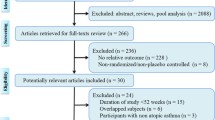Abstract
As part of the National Institute for Health and Care Excellence (NICE) Single Technology Appraisal (STA) process, the manufacturer of reslizumab (Teva) submitted evidence for its clinical and cost effectiveness for the treatment of eosinophilic asthma inadequately controlled by inhaled corticosteroids. NICE commissioned Southampton Health Technology Assessments Centre (SHTAC) as an independent Evidence Review Group (ERG) to provide a critique of the manufacturer’s submitted evidence. Reslizumab is compared with best standard of care and omalizumab, for a small ‘overlap’ population of patients who have both eosinophilic and IgE-mediated severe asthma. This paper provides a summary of the ERG’s review of the manufacturer’s submission, and summarises the NICE Appraisal Committee’s subsequent guidance (issued in August 2017). The ERG considered that there were limitations in the approach proposed by the manufacturer for the exacerbation rate and the utility for severe exacerbation. The company amended their initial analysis, following comments from the ERG and the NICE committee, whereby the incremental cost effectiveness ratio was £29,870 per QALY gained for reslizumab compared with best standard care. The NICE Appraisal Committee (AC) concluded that reslizumab was recommended as an option for the treatment of severe eosinophilic asthma that is inadequately controlled in adults despite maintenance therapy with high-dose inhaled corticosteroids plus another drug, only if (1) the blood eosinophil count has been recorded as 400 cells per microlitre or more and (2) the patient has had three or more asthma exacerbations in the past 12 months, and (3) the company provides reslizumab with the discount agreed in the patient access scheme.
Similar content being viewed by others
References
National Institute for Health and Care Excellence. Asthma (eosinophilic)—reslizumab (after inhaled corticosteroids). 2017. https://www.nice.org.uk/guidance/ta479. Accessed Oct 2017.
National Institute for Health and Care Excellence. 2017. https://www.nice.org.uk/. Accessed Oct 2017.
Asthma UK. Asthma facts and statistics. 2016. https://www.asthma.org.uk/about/media/facts-and-statistics/. Accessed Oct 2017.
Asthma UK. 2017. https://www.asthma.org.uk/about/media/news/asthma-uk-study-1.1bn/. Accessed Oct 2017
European Respiratory Society (ERS). Assessing asthma quality of life: its role in clinical practice. 2005. http://breathe.ersjournals.com/content/breathe/1/3/192.full.pdf. Accessed Oct 2017.
British Thoracic Society and Scottish Intercollegiate Guidelines Network. SIGN 141. British Guideline on the Management of Asthma. 2014.
Global Initiative for Asthma. Global strategy for asthma management and prevention (2016 update). 2016. http://ginasthma.org/wp-content/uploads/2016/04/GINA-2016-main-report_tracked.pdf. Accessed Oct 2017.
Novelli F, Lenzini G, Latorre M, Seccia V, Bartoli ML, Malagrinò L, et al. Influence of obesity and nasal polyps on severe asthma. Eur Respir J. 2013;42(Suppl. 57):P4177.
Chang PJ, Bhavsar PK, Michaeloudes C, Khorasani N, Chung KF. Corticosteroid insensitivity of chemokine expression in airway smooth muscle of patients with severe asthma. J Allergy Clin Immunol. 2012;130(4):877–85.
Humbert M, Beasley R, Ayres J, Slavin R, Hebert J, Bousquet J, et al. Benefits of omalizumab as add-on therapy in patients with severe persistent asthma who are inadequately controlled despite best available therapy (GINA 2002 step 4 treatment): INNOVATE. Allergy. 2005;60(3):309–16.
Castro M, Zangrilli J, Wechsler M, Bateman E, Brusselle G, Bardin P, et al. Reslizumab for inadequately controlled asthma with elevated blood eosinophil counts: results from two multicentre, parallel, double-blind, randomised, placebo-controlled, phase 3 trials. Lancet Respir Med. 2015;3:355–66.
Bjermer L, Lemiere C, Maspero J, Weiss S, Zangrilli J, Germinaro M. Reslizumab for inadequately controlled asthma with elevated blood eosinophil levels: a randomized phase 3 study. Chest. 2016;150(4):789–98.
Corren J, Weinstein S, Janka L, Zangrilli J, Garin M. Phase 3 study of reslizumab in patients with poorly controlled asthma: effects across a broad range of eosinophil counts. Chest. 2016;150(4):799–810.
Castro M, Mathur S, Hargreave F, Boulet L-P, Xie F, Young J, et al. Reslizumab for poorly controlled, eosinophilic asthma. A randomized, placebo-controlled study. Am J Respir Crit Care Med. 2011;184:1126–32.
Hanania N, Wenzel S, Rosen K, Hsieh H-J, Mosesova S, Choy D, et al. Exploring the effects of omalizumab in allergic asthma. Am J Respir Crit Care Med. 2013;187(8):804–11.
Willson J, Bateman ED, Pavord I, Lloyd A, Krivasi T, Esser D. Cost effectiveness of tiotropium in patients with asthma poorly controlled on inhaled glucocorticosteroids and long-acting beta-agonists. Appl Health Econ Health Policy. 2014;12(4):447–59.
Lloyd A, Price D, Brown R. The impact of asthma exacerbations on health-related quality of life in moderate to severe asthma patients in the UK. Prim Care Respir J. 2007;16(1):22–7.
National Institute for Health and Care Excellence. Single Technology Appraisal. Mepolizumab for treating severe eosinophilic asthma [ID798]. Committee papers 2016. https://www.nice.org.uk/guidance/ta431. Accessed Oct 2017.
Acknowledgements
This summary of the ERG report was compiled after NICE issued the FAD. All authors have commented on the submitted manuscript and have given their approval for the full version to be published. The view and opinions expressed here are those of the authors and do not necessarily reflect those of NICE or the Department of Health. Any errors are the responsibility of the authors.
Author information
Authors and Affiliations
Contributions
KC and MR critically appraised the health economic systematic review, critically appraised the economic evaluation and drafted the report. PH and KP critically appraised the clinical effectiveness systematic review and drafted the report. MC critically appraised the economic evaluation and drafted the report. GF critically appraised the clinical effectiveness systematic review, drafted the report, project managed the review and is the project guarantor. This summary has not been externally reviewed by PharmacoEconomics.
Corresponding author
Ethics declarations
Funding
This work was funded by the National Institute for Health Research Health Technology Assessment programme as Project number 15/121/14.
Conflict of interest
All authors (KC, GF, PH, MR, MC and KP) had no conflicts of interest.
Rights and permissions
About this article
Cite this article
Cooper, K., Frampton, G., Harris, P. et al. Reslizumab for Treating Asthma with Elevated Blood Eosinophils Inadequately Controlled by Inhaled Corticosteroids: An Evidence Review Group Perspective of a NICE Single Technology Appraisal. PharmacoEconomics 36, 545–553 (2018). https://doi.org/10.1007/s40273-017-0608-z
Published:
Issue Date:
DOI: https://doi.org/10.1007/s40273-017-0608-z




